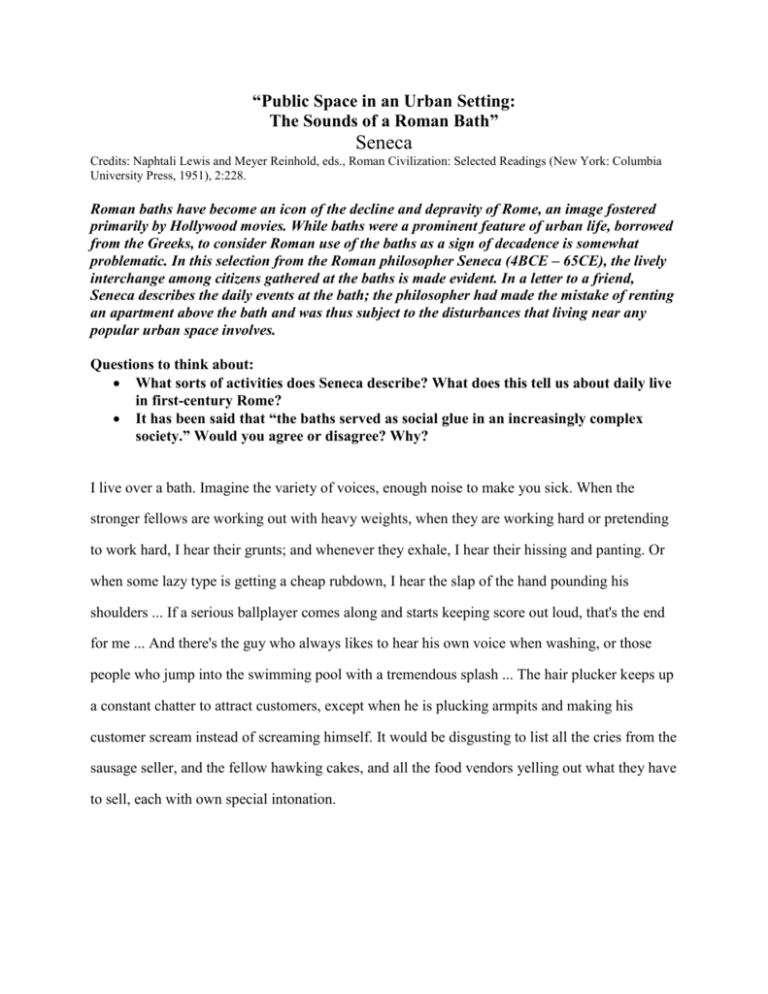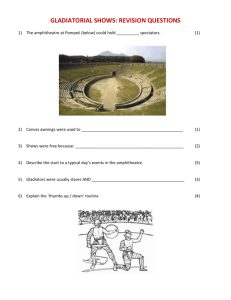Graffiti from the Walls of Pompeii
advertisement

“Public Space in an Urban Setting: The Sounds of a Roman Bath” Seneca Credits: Naphtali Lewis and Meyer Reinhold, eds., Roman Civilization: Selected Readings (New York: Columbia University Press, 1951), 2:228. Roman baths have become an icon of the decline and depravity of Rome, an image fostered primarily by Hollywood movies. While baths were a prominent feature of urban life, borrowed from the Greeks, to consider Roman use of the baths as a sign of decadence is somewhat problematic. In this selection from the Roman philosopher Seneca (4BCE – 65CE), the lively interchange among citizens gathered at the baths is made evident. In a letter to a friend, Seneca describes the daily events at the bath; the philosopher had made the mistake of renting an apartment above the bath and was thus subject to the disturbances that living near any popular urban space involves. Questions to think about: What sorts of activities does Seneca describe? What does this tell us about daily live in first-century Rome? It has been said that “the baths served as social glue in an increasingly complex society.” Would you agree or disagree? Why? I live over a bath. Imagine the variety of voices, enough noise to make you sick. When the stronger fellows are working out with heavy weights, when they are working hard or pretending to work hard, I hear their grunts; and whenever they exhale, I hear their hissing and panting. Or when some lazy type is getting a cheap rubdown, I hear the slap of the hand pounding his shoulders ... If a serious ballplayer comes along and starts keeping score out loud, that's the end for me ... And there's the guy who always likes to hear his own voice when washing, or those people who jump into the swimming pool with a tremendous splash ... The hair plucker keeps up a constant chatter to attract customers, except when he is plucking armpits and making his customer scream instead of screaming himself. It would be disgusting to list all the cries from the sausage seller, and the fellow hawking cakes, and all the food vendors yelling out what they have to sell, each with own special intonation. Graffiti from the Walls of Pompeii (c.79 CE) This selection features an unusual source of material: graffiti. Taken from the walls of the popular resort Pompeii, which was destroyed by the eruption of Mount Vesuvius in 79 CE, these pieces of popular culture provide fascinating insight into the daily life, cares, and crimes of the times. Ranging from market announcements to local politicians' pleas for votes to lovers' laments, this graffiti, revealed by archeological digs, opens a door into the everyday existence of Roman men and women of the first century CE. Questions to think about: Based upon the graffiti presented here, what issue and events seem to have been of greatest concern to the people of Pompeii? How does the graffiti here differ from the kind you might see in a modern American city? What does this graffiti reveal about the similarities and differences between the ordinary people of ancient Rome and the people of today? How would you account for the differences? The fruit dealers together with Helvius Vestalis unanimously urge the election of Marcus Holconius Priscus as duovir with judicial power. I ask you to elect Gaius Julius Polybius aedile. He gets good bread. The muleteers urge the election of Gaius Julius Polybius as duovir. The worshippers of Isis unanimously urge the election of Gnaeus Helvius Sabinus as aedile. Proculus, make Sabinus aedile and he will do as much for you. His neighbors urge you to elect Lucius Statius Receptus duovir with judicial power; he is worthy. Aemilius Celer, a neighbor, wrote this. May you take sick if you maliciously erase this! Satia and Petronia support and ask you to elect Marcus Casellius and Lucius Albucius aediles. May we always have such citizens in our colony! I ask you to elect Epidius Sabinus duovir with judicial power. He is worthy, a defender of the colony, and in the opinion of the respected judge Suedius Clemens and by agreement of the council, because of his services and uprightness, worthy of the municipality. Elect him! I ask you to elect Marcus Cerrinius Vatia the aedileship. All the late drinkers support him. Florus and Fructus wrote this. The petty thieves support Vatia for the aedileship. I ask you to elect Aulus Vettius Firmus aedile. He is worthy of the municipality. I ask you to elect him, ballplayers. Elect him! I wonder, O, wall, that you have not fallen in ruins from supporting the stupidities of so many scribblers. Twenty pairs of gladiators of Decimus Lucretius Satrius Valens, lifetime flamen of Nero son of Caesar Augustus, and ten pairs of gladiators of Decimus Lucretius Valens, his son, will fight at Pompeii on April 8, 9, 10, 11, 12. There will be a full card of wild beast combats, and awnings [for the spectators]. Aemilius Celer [painted this sign], all alone in the moonlight. Market days: Saturday in Pompeii, Sunday in Nuceria, Monday in Atella, Tuesday in Nola, Wednesday in Cumae, Thursday in Puteoli, Friday in Rome. 6th: cheese 1, bread 8, oil 3, wine 3 7th: bread 8, oil 5, onions 5, bowl 1, bread for the slave[?] 2, wine 2 8th: bread 8, bread for the slave[?] 4, grits 3 9th: wine for the winner 1 denarius, bread 8, wine 2, cheese 2 10th:1 denarius, bread 2, for women 8, wheat 1 denarius, cucumber 1, dates 1, incense 1, cheese 2, sausage 1, soft cheese 4, oil 7 Pleasure says: "You can get a drink here for an as [a small coin], a better drink for two, Falernian for four. A copper pot is missing from this shop. 65 sesterces reward if anybody brings it back, 20 sesterces if he reveals the thief so we can get our property back. The weaver Successus loves the inkeeper's slave girl, Iris by name. She doesn't care for him, but he begs her to take pity on him. Written by his rival. So long. [Answer by the rival:] Just because you're bursting with envy, don't pick on a handsomer man, a lady-killer and a gallant. [Answer by the first writer:] There's nothing more to say or write. You love Iris, who doesn't care for you. Take your lewd looks and flirting eyes off another man's wife, and show some decency on your face! Anybody in love, come here. I want to break Venus' ribs with a club and cripple the goddess' loins. If she can pierce my tender breast, why can't I break her head with a club? I write at Love's dictation and Cupid's instruction; But damn it! I don't want to be a god without you. [A prostitute's sign:] I am yours for 2 asses cash.








